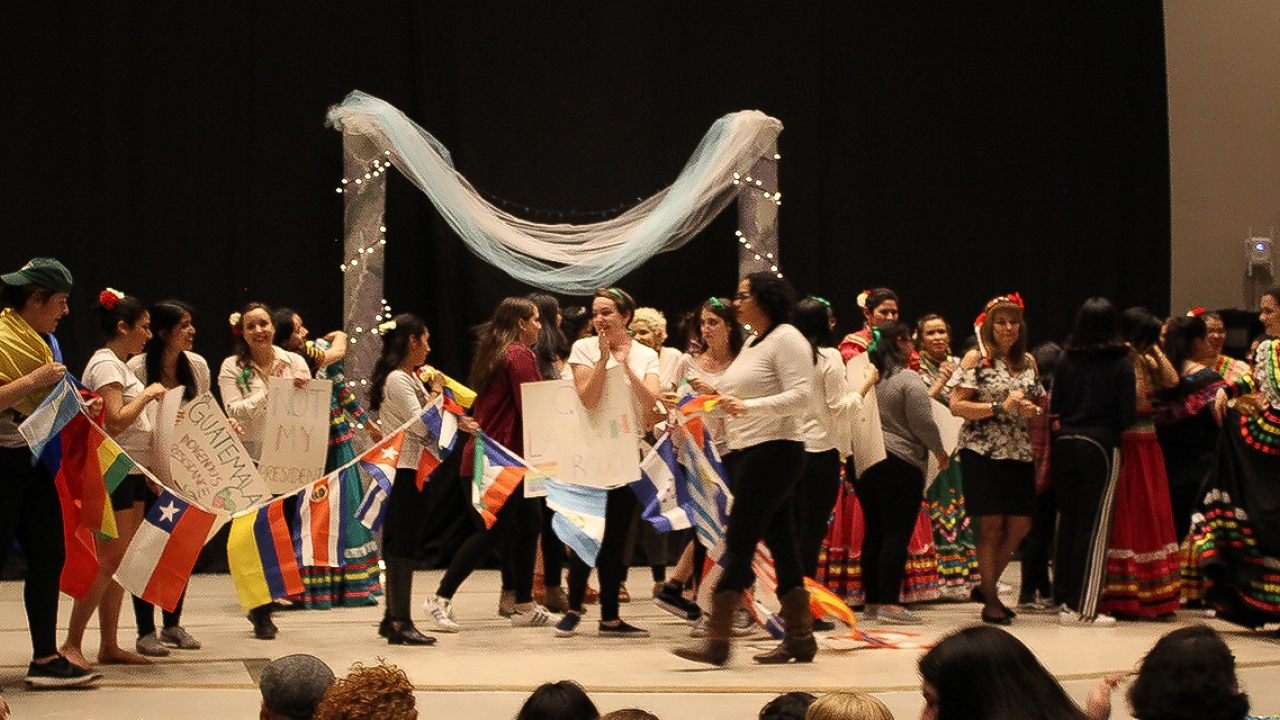Wellesley Celebrates Latinx Month

Every April, Wellesley celebrates Latinx Month with performances, lectures, and workshops that highlight Latinx culture, heritage, and history and the many contributions of Latinx students, faculty, and staff to campus.
This year’s activities began on April 5 with Noche de Cine, hosted by Wellesley’s Spanish department, which featured a screening of Sin Nombre, a 2009 film about the challenges migrants from Central America face as they try to reach the U.S. border.
On April 7, the 15th annual Latinx Culture Show featured dances, songs, skits, poetry, and more. This year’s theme was quinceañera, the celebration of a girl’s 15th birthday, which symbolizes her transition from childhood to young womanhood. The evening included a performance by Wellesley’s new mariachi group, performing alongside Harvard University’s mariachi group, as well as a PowerPoint presentation with images and clips from previous shows.
“It was really touching to see how current students paid homage to the students and shows that came before them in the slide presentation,” said Mared Alicea-Westort, assistant dean of intercultural education and advisor to Latina students and Fusion, Wellesley’s organization for mixed-race students.
On April 10, Juliet V. Garcia—the first Hispanic woman to lead a U.S. college or university (she served as president of the University of Texas, Brownsville for 22 years)—delivered the Latinx Month keynote address. Garcia talked about growing up as the daughter of immigrants, the death of her mother when she was a child, and the strengths she brings to her work as a Latina woman. Garcia, who has served as chair of the American Council on Education (ACE), the nation’s largest higher education association, and as a member of the White House Initiative on Educational Excellence for Hispanic Americans, also discussed how it felt, early on, to be one of the very few women in leadership roles in higher education.
“Dr. Garcia provided inspiration and encouragement to those who may wish to follow in her footsteps. We were delighted that she accepted our invitation to come and speak at Wellesley,” said Alicea-Westort, who planned most of the Latinx Month events with a committee made up of students, staff, and faculty.
Other Latinx events held earlier this month were a lecture on closing the digital divide given by Jordana Barton, senior advisor at the Federal Reserve Bank in Dallas; an appreciation dinner for Latinx employees at Wellesley; and storytelling by Bobby Gonzalez, a Taino and Puerto Rican speaker and writer who encourages discourse on Latinx identities. Anna Rios ’01 also appeared, speaking about her journey from East L.A. to Wellesley, Wall Street, and Hollywood; and Acorns, Wellesley’s multicultural space for Asian and Latinx students, hosted a Latinx café.
Latinx Month programming continues on April 21, with Carlos Andrés Gómez, an award-winning Colombian-American poet and spoken-word performer whose work deals with stereotypes and contemporary issues affecting Latinx groups in the United States.
“I spoke to Mared, our Latinx advisor, about bringing Carlos Andrés Gómez to campus because I’ve always felt a lack of representation of my identity as a Colombian Latina who has grown up in the United States,” said Ivonne Marmolejo ’17, co-president of Mezcla, the largest of Wellesley’s five Latina groups. “I find it important to be involved with Latinx Month planning because it’s an opportunity to have a say in the diverse programming that has the potential to spark conversations about and showcase the experiences and challenges our communities face, be in it access to and success in higher education, growing up in a bicultural space, or fighting stereotypes of what being Latinx means.”
On April 25, Denise Soler Cox, a cultural blogger for Huffington Post Latino, will present Project Enye, a multimedia project that explores the experience of first-generation, American-born Latinx (called Enyes), who share a distinct identity shaped by the experience of growing up between two cultures. On April 27, a Latinx alumnae panel will discuss navigating the job market and graduate school. On May 2, Prisca Dorcas Mojica Rodriguez, founder of the online platform Latina Rebels, will give a lecture about her work as a Nicaraguan writer and activist, and the Latinx Wellness Program will give a workshop on stress reduction and holistic health practices.
These events not only benefit the entire Wellesley Community, but also help Latinx students feel that their cultural identities are represented on campus and their experiences are supported and validated, said Alicea-Westort.
“Latinx Month allows us to showcase Latinx diversity within the context of many different traditions and cultures. We are not all Mexican-Americans, not all of us like spicy food, and we don’t all speak Spanish,” she said. “Instead, we are from various races, faiths, and socioeconomic backgrounds, yet we are connected by a shared history, traditions, and common values.
The Latinx Month Planning Committee helped make this year’s Latinx Month possible.
Members include professors Joy Renjilian-Burgy, Antonio Igrejas, Carlos Ramos, Petra Rivera-Rideau, Jill Syverson-Stork; staff members Cassandra Flores Montaño, Jael Matos, and Sandra Murga; and students Denisse Becerra ’19, Diana Castillo ’17, Mariela Dyer ’20, Ivonne Marmolejo ’17, Cassandra Morales ’20, Allie Van Horn ’19, and Liliana Westort ’18.



